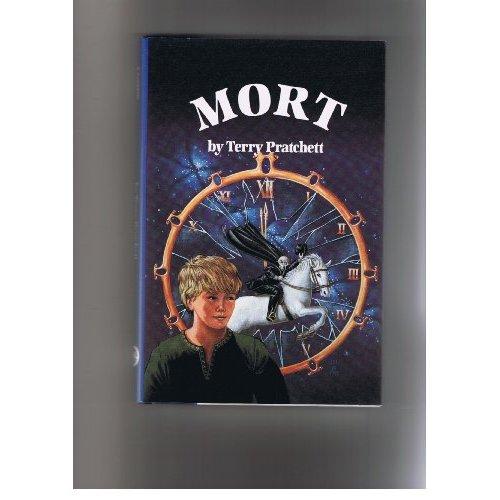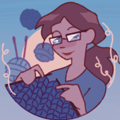Narayoni reviewed Mort by Terry Pratchett
Mort: A Hilarious and Heartfelt Adventure with Death
4 stars
Mort is a funny, heartwarming introduction to Death, one of the major Discworld characters. It starts off with Death deciding to take on an apprentice, Mort. Turns out, Death loves curry, has an adopted daughter, Ysabell, and gets REALLY UPSET and VERY ANGRY indeed when people harm or kill cats and kittens. And he rides a horse who is most adorably named Binky.
After starting on his new job and getting acquainted with Death’s household consisting of Ysabell and his servant Albert, Mort starts to realise that one of the reasons for Death taking on an apprentice was so that Ysabell would have a companion to talk with. After showing him the ropes so to speak, Death starts to send Mort on solo missions. One of the souls he has to usher into the beyond is that of young Princess Keli who is about to be assassinated by an assassin …
Mort is a funny, heartwarming introduction to Death, one of the major Discworld characters. It starts off with Death deciding to take on an apprentice, Mort. Turns out, Death loves curry, has an adopted daughter, Ysabell, and gets REALLY UPSET and VERY ANGRY indeed when people harm or kill cats and kittens. And he rides a horse who is most adorably named Binky.
After starting on his new job and getting acquainted with Death’s household consisting of Ysabell and his servant Albert, Mort starts to realise that one of the reasons for Death taking on an apprentice was so that Ysabell would have a companion to talk with. After showing him the ropes so to speak, Death starts to send Mort on solo missions. One of the souls he has to usher into the beyond is that of young Princess Keli who is about to be assassinated by an assassin sent by her uncle. Unfortunately, Mort falls for the princess and in order to save her kills the assassin instead, thus interfering with fate, precisely something he had been told not to do. Mort is too scared to confess to Death about what he has done, so he just stays silent. Unluckily for him, reality of the history that was to be starts to resist the reality of what Mort has done, leading to the possibility that Princess Keli, whom Mort had saved, might end up dying. So now Mort tries his best to somehow save the princess’ life.
Some of my favourite things about this book are the style of humour and getting to know Death. Death is a cat loving anthropomorphic personification making sometimes refreshing, sometimes very insightful takes about mortals and existence in general:
"TAKE THESE THINGS, NOW, said Death, fingering a passing canapé. I MEAN, MUSHROOMS YES, CHICKEN YES, CREAM YES, I’VE NOTHING AGAINST ANY OF THEM, BUT WHY IN THE NAME OF SANITY MINCE THEM ALL UP AND PUT THEM IN LITTLE PASTRY CASES? ‘Pardon?’ said Mort. THAT’S MORTALS FOR YOU, Death continued. THEY’VE ONLY GOT A FEW YEARS IN THIS WORLD AND THEY SPEND THEM ALL IN MAKING THINGS COMPLICATED FOR THEMSELVES. FASCINATING. HAVE A GHERKIN.”
“He gave it an experimental shake. AND DUE TO LIVE ANOTHER THIRTY, THIRTY-FIVE YEARS, he said, with a sigh. ‘And he goes around killing people?’ said Mort. He shook his head. ‘There’s no justice.’ Death sighed. NO, he said, handing his drink to a page who was surprised to find he was suddenly holding an empty glass, THERE’S JUST ME.”
Death also happens to be very keen on trying to understand more about humans and various human activities, such as how people have fun. This leads to some unintentionally hilarious circumstances: “WHAT IS THIS FUN? ‘This is!’ TO KICK VIGOROUSLY IS FUN? ‘Well, part of the fun. Kick!’ TO HEAR LOUD MUSIC IN HOT ROOMS IS FUN? ‘Possibly.’ HOW IS THIS FUN MANIFEST? ‘Well, it – look, either you’re having fun or you’re not, you don’t have to ask me, you just know, all right? How did you get in here, anyway?’ he added. ‘Are you a friend of the Patrician?’ LET US SAY, HE PUTS BUSINESS MY WAY. I FELT I OUGHT TO LEARN SOMETHING OF HUMAN PLEASURES. ‘Sounds like you’ve got a long way to go.’ I KNOW. PLEASE EXCUSE MY LAMENTABLE IGNORANCE. I WISH ONLY TO LEARN. ALL THESE PEOPLE, PLEASE – THEY ARE HAVING FUN? ‘Yes!’ THEN THIS IS FUN. ‘I’m glad we got that sorted out. Mind the chair,’ snapped Lord Rodley, who was now feeling very unfunny and unpleasantly sober. A voice behind him said quietly: THIS IS FUN. TO DRINK EXCESSIVELY IS FUN. WE ARE HAVING FUN. HE IS HAVING FUN. THIS IS SOME FUN. WHAT FUN.” As the story progresses, it starts getting clearer that the loneliness of his job was getting to him, providing some clue to Death’s actual intentions for hiring Mort: "‘Drowning your sorrows, are you? I HAVE NO SORROWS. ‘No, of course not. Forget I mentioned it.’ He gave the glass a few more wipes. ‘Just thought it helps to have someone to talk to,’ he said. The stranger was silent for a moment, thinking. Then he said: YOU WANT TO TALK TO ME? ‘Yes. Sure. I’m a good listener.’ NO ONE EVER WANTED TO TALK TO ME BEFORE. ‘That’s a shame.’ THEY NEVER INVITE ME TO PARTIES, YOU KNOW. ‘Tch.’ THEY ALL HATE ME. EVERYONE HATES ME. I DON’T HAVE A SINGLE FRIEND.” After all, his job was such that “Death must be the loneliest creature in the universe. In the great party of Creation, he was always in the kitchen.”
This is followed by an interesting and humorous phase of Death actually trying to find an alternate job for himself. He ultimately ends up getting the job of a cook at "Harga’s House of Ribs down by the docks” where he thoroughly enjoyed himself as he “spun and whirled, chopping, slicing and frying. His skillet flashed through the fetid steam. He’d opened the door to the cold night air, and a dozen neighbourhood cats had strolled in, attracted by the bowls of milk and meat – some of Harga’s best, if he’d known – that had been strategically placed around the floor. Occasionally Death would pause in his work and scratch one of them behind the ears. ‘Happiness,’ he said, and puzzled at the sound of his own voice.” This leads to a truly hilarious scene when as a result of being summoned during the Rite of AshkEnte, Death appears “wearing an apron and holding a small kitten.”
Death’s efforts with trying to find work that he would actually enjoy doing and Mort’s princess problem inevitably collide leading to a satisfying conclusion. This is the second time I am reading this book and I think I enjoyed and loved it even more than I did the first time around. I would love to share some more jokes here, but then I would probably end up copy-pasting the whole book! This book definitely does the job of making me laugh and feeling a little better than usual.




